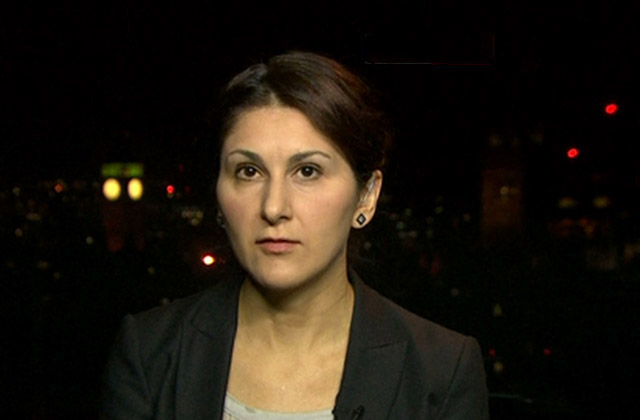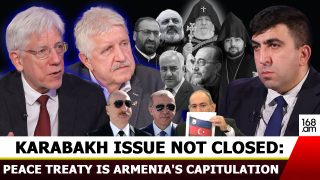“A political order is being crystallized in Armenia, which exists in African countries—clientelism”

168.am presents part of interview with Lilit Gevorgyan, Russia and CIS, Europe senior analyst at IHS Global Insight, covering domestic policy issues.
Parliamentary elections were held in Armenia on April 2. What’s your assessment to the pre-election process, used rhetoric, voting and the results?
Results were strictly predictable. We had no doubt that RPA will hold the power. After constitutional change elections were the second ritual step. By this step incumbent leaders cemented their leading positions for the upcoming years.
It would be rather surprising that in this hyper-centralized oligarchic system radical changes were recorded through elections. Of course, we may touch upon the alliances and tactics of pre-election struggle of the political parties or giving bribe and use of force, however, no matter how surprising it may sound, they are inessential.
A political system is being crystallized in Armenia, which exists in several African countries for a long time—it’s clientelism. Here the ruling elite (sponsors or patrons control country’s resources—perspectives for workplaces, doing business, getting education and as if becoming a specialist. And clients—those depending on “patrons” exchange their vote or loyalty, humbleness for having a workplace, private business, carrier for a simple election bribe or not having issues with the Police or at workplace.
“Patrons or owners” from time to time also use force to remind that the monopoly of force belongs to them.
It’s interesting that in such a system there is contestation as well, but amid “patrons”. Armenia’s system isn’t an exception in this regard: some oligarchs failed to enter the parliament. Already a few years ago it was clear that generation change among oligarchs will take place as well.
How do you explain 50% of votes gained by RPA in case, when deep discontent and despair dominates in the country from the policy pursued by the authorities?
On account of the number of those disappointed with the policy in Armenia, high percentage of participants is at least suspicious. There is no any international conclusion that fair and free elections have been held in Armenia. However, let me repeat, no matter how strange it may sound, these are insignificant details.
Answer to your question is in the first part of RPA slogan: “stability”, i.e. this was a promise, that this system won’t change, and those, who found the way of having a position in the system, or doing business, will have a guarantee that this won’t change. And issue of those with low incomes is solved through threat. Threat, that they may be deprived of their workplace, threat that in case of a change even worse leadership may come to power (in post-Soviet countries this was a type of widely spread state propaganda as if old leaders are full and new ones will mandatory steal). Threat that radical changes may have a bad ending, i.e. it’s dangerous to take a risk.
Election bribe is only a part of an iceberg, which isn’t so productive. It’s impossible to win in these elections through bribe only. Suppose, no bribe was taken and 80% of voters voted against RPA and the latter’s protégé parties. Few people in Armenia will believe that current elite will simply accept the results and will leave.
It’s rather painful and interesting to see, that “uneducated and bribed” ordinary people are accused of election results. This, of course, is a smart way to divert the attention from real reasons. Finally, the middle class comprises the backbone of this system, which is a result of either work in public sector or business created through sponsorship. These groups are also displeased, but not so much to self-organize and change clientelism.
Failure of the first president was rather noteworthy, who has chosen the slogan “peace, reconciliation and wellbeing” making NK conflict as key of his campaign. The first president himself also insisted that his approaches are close to those of RPA and Serzh Sargsyan on the topic. In that case why did this bloc fail?
What kind of a parliament are we going to have under current state of affairs—RPA, ARF, “Tsarukyan” and “Yelk” blocs? Should new quality be anticipated from the future government?
Like before, currently the parliament will have ritual role. Currently in Armenia the president is making decision and from 2018—the Prime Minister. The parliament is simply an organ putting a stamp.
How can these election results be somewhat reflected in Armenia’s foreign policy?
Foreign policy decisions like before will be adopted by the president, and obedient parliament will accept it.
How do you explain failure of powers raising foreign policy issues, including “Free Democrats” party, which positioned itself as stressed Western party? Isn’t the society interested in foreign policy issues?
As I said, main obstacle is clientelism, system of “patrons”/”sponsorship”. It won’t allow such parties to be elected.
Under conditions of clientelism the party proposing radical changes should show what economic benefits it may bring to employees or business. It should show that radical changes won’t lead to loss of positions or their business gained under RPA, and will only improve the situation. This is the minimum that the voters, who are the backbone of this system (who are also election fraud implementers), allowed that they were free elections.
In case of “Free Democrats” the main obstacle of gaining votes against RPA was being Western and ideologist. Being Western or a free democrat doesn’t mean more for the large number of city and community inhabitants. Moreover, overwhelming majority of Armenia’s population is pro-Russian. Most part of the population shares Putin’s views, believes like Russians that the best political solution is having a fair, tough and powerful leader, and it isn’t mandatory that he was elected. Many in Armenia perceive Putin as their leader and Armenia as a region existing under the wing of Moscow.
Most voters yet fail to see what connection exists in the direction of Armenia’s foreign policy and their low salaries, high food prices, high gas prices. I consider it’s random that the issue of foreign policy issue may bring election victory.
By Araks Martirosyan

























